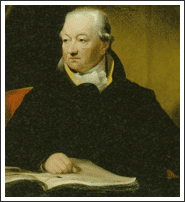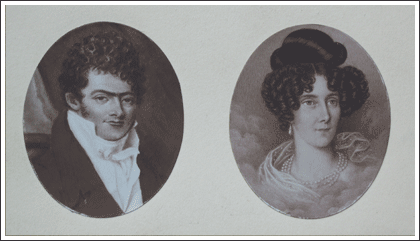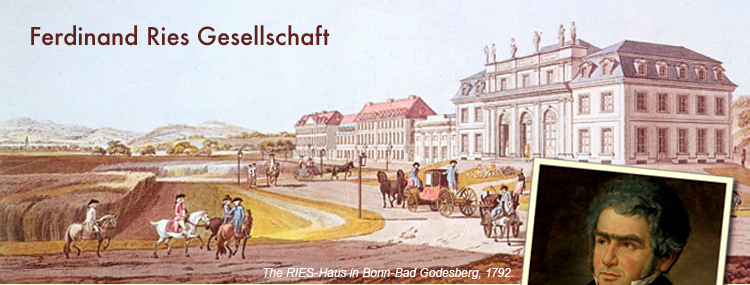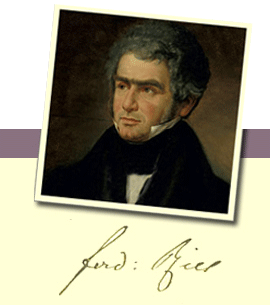Biography - London
 Arriving in London in April 1813, Ferdinand Ries would certainly have lost no time in visiting the old friend of his father’s and grandfather’s, Johann Peter Salomon (1745-1815), who counted among London’s most influential musical celebrities and who only a few months before had co-founded the London Philharmonic Society. Salomon had shared the same music stand with grandfather Johann in the court orchestra at Bonn and had been the violin teacher of Ferdinand’s father, Franz Anton. Salomon and Ferdinand Ries soon became close friends. Indeed, the very fact that only a short time later Salomon appointed his young fellow-countryman as the executor of his last will and testament shows how much he trusted him. Arriving in London in April 1813, Ferdinand Ries would certainly have lost no time in visiting the old friend of his father’s and grandfather’s, Johann Peter Salomon (1745-1815), who counted among London’s most influential musical celebrities and who only a few months before had co-founded the London Philharmonic Society. Salomon had shared the same music stand with grandfather Johann in the court orchestra at Bonn and had been the violin teacher of Ferdinand’s father, Franz Anton. Salomon and Ferdinand Ries soon became close friends. Indeed, the very fact that only a short time later Salomon appointed his young fellow-countryman as the executor of his last will and testament shows how much he trusted him.
In 1815 Ferdinand Ries became a member and – before the end of that same year – one of the directors of the London Philharmonic Society, for which he composed several works. He also became a popular teacher of music in the wealthier circles of London society, mainly among merchants and bankers. As he had already become a Freemason in Bonn in 1806, he would certainly have sought contact with the Masonic Lodge in London, a supposition borne out by the fact that one of his London compositions was dedicated to the Duke of Sussex, who was its Grand Master. In 1814 Ries married Harriet Mangeon, a wealthy young London woman.
Even while he was in London, Ferdinand Ries remained in close contact with his teacher and friend Ludwig van Beethoven. For Beethoven, who was gaining more and more recognition in London, the presence of a close friend in that city was an enormous advantage. As he had done in Vienna, Ries again acted as Beethoven’s business agent with various patrons and publishing houses, correcting on Beethoven’s instructions any mistakes that had crept into the manuscript copies prior to printing and negotiating the best possible terms for the publication of Beethoven’s works. It was also Ferdinand Ries who, on behalf of the Philharmonic Society, commissioned Beethoven to write his 9th Symphony and invited him to London as the Society’s guest.

Ferdinand Ries and his wife enjoyed great esteem in London’s musical and theatrical circles. Their home was a magnet for many German musicians who visited London. In 1819, for example, they received a visit from Louis Spohr and his wife Dorette, a harpist, when they came to London. This visit resulted in a friendship that lasted right up until Ries’s early death in 1838.
During his years in London, Ries applied himself more than ever before to the composition of virtuoso piano pieces, of rondos, dances and fantasies on popular folk songs and opera melodies; it was these works that may have largely contributed to Ries’s reputation as a virtuoso on the pianoforte. Moreover, his leading position in the Philharmonic Society also afforded him many an opportunity for performing his own orchestral works. Six of his eight symphonies were composed in London and like other large-scale compositions, were premiered in concerts of the Philharmonic Society.
During his years in London, Ries applied himself more than ever before to the composition of virtuoso piano pieces, of rondos, dances and fantasies on popular folk songs and opera melodies; it was these works that may have largely contributed to Ries’s reputation as a virtuoso on the pianoforte. Moreover, his position as one of the directors of the Philharmonic Society also afforded him many an opportunity for performing his own orchestral works. Six of his eight symphonies were composed in London and were performed at concerts of the Philharmonic Society.
In 1824 Ferdinand Ries returned, with his wife and their three children, to his native Rhineland. On 3rd May 1824 he gave a farewell concert at the London Philharmonic Society, for which he had composed a “Farewell Concerto from England” for piano and orchestra. He and his family embarked from Dover on 9th July. To mark his departure from London the well-known music periodical “The Harmonicon” published a portrait of Ries that clearly underscored his reputation as a virtuoso pianist and composer:
“Mr. Ries is justly celebrated as one of the finest piano-performers of the present day. His hand is powerful, and his execution is certain, - often surprising. But his playing is most distinguished from that of all others by his romantic wildness. By means of strong contrasts of loud and soft, and a liberal use of the open pedals, together with much novelty and great boldness in his modulations, he produces an effect upon those who enter into his style, which can only be compared to that arising from the most unexpected combinations and transitions of the Aeolian harp. It is purely German, and shews him to be, - as we once before remarked, - a true-born native of that country to which, according to Richter, belongs ‘the empire of the air’.”
|
|
|

